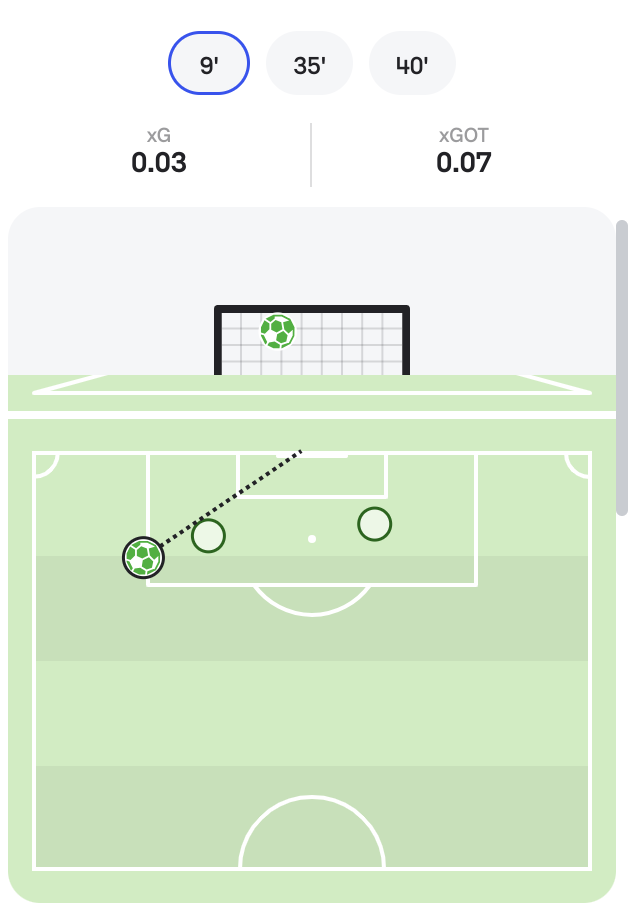Manchester City emerges victorious against FC Copenhagen to secure a spot in the Champions League quarterfinals.
Although starting with a two-goal advantage, Manchester City didn’t hesitate to show why they deserved their seventh consecutive qualification to the UEFA Champions League quarterfinals.
Following a tough match in the Premier League title race against Liverpool, Guardiola chose to rest Kevin De Bruyne and Phil Foden, opting for the following starting 11 in a 4-2-3-1 system.
 Starting Lineups
Starting Lineups
One of the vulnerabilities of the 4-2-3-1 formation is that the flanks can be exposed on the counterattack if the two central defenders are pushed forward, and the full-backs are also pushed up to support the attack.
Considering the playing style of Manchester City, which is based on possession and suffocating pressing, Jacob Neestrup sought to exploit this by opting for a 3-4-2-1 system.
Three central defenders aim to control City’s offensive barrage, while Ankensen and Jelert can exploit the open flanks on the counterattack and engage in various combinations with the attacking midfielders.
 Manchester City dominates the game through possession.
Manchester City dominates the game through possession.
As usual, the Citizens employ a possession-based positional game with aggressive high pressing when they lose the ball. They open the scoring as early as the 5th minute, from a corner that finds Akanji perfectly, who volleys it into the net.
It doesn’t take long for City to convert another corner. Alvarez crosses to the far post where he finds Rodri, who manages to shake off Elyounoussi in the congestion created by his teammates in the 6-yard box. The Danes are saved by the crossbar, and the ball falls back to Alvarez. He shoots powerfully from a very difficult position, with an xG of just 0.03, but Grabara doesn’t settle for just parrying the ball over the bar; he attempts to catch it, but it slips through his fingers.
 Alvarez’s exceptional shot slips through Grabara’s fingers.
Alvarez’s exceptional shot slips through Grabara’s fingers.
However, Neestrup’s tactics also pay off in the 29th minute, as FC Copenhagen shows that they deserve a place in European competitions by scoring one of the most beautiful goals of this round. A pass to Erling Haaland is intercepted, and Elyounoussi starts an attack on the left flank, assisted by Oskarsson. They combine well, and Elyounoussi manages to score, bringing immense joy to the Danish fans who have supported their team throughout the game.
However, Manchester City continued to dictate the rhythm of the game, using a passing game with short and precise passes, as evidenced clearly in the statistics, where Guardiola’s team had 407 passes with an accuracy of 92%, more than twice as much as FC Copenhagen. They slowly built up their attacks into the opponent’s box.
Throughout the half, Erling Haaland patrolled between the Danish defensive lines, waiting on the offside line to be served by his teammates. This strategy paid off just before halftime when Rodri, known for his incisive passes, spotted the space Haaland enjoyed between the two central defenders and launched him. Haaland made room on the left side and managed to equalize the total number of goals scored by Sergio Aguero in the UCL.
Entering halftime with an aggregate advantage of 4 goals, the Citizens slowed down the pace of the game, considering they have a tough match ahead against the Premier League leaders, who are just one point away. A victory against them would propel City to the top position in the standings.
Although they probably faced the easiest opponent in the UCL round of 16, Manchester City once again showed that they have aspirations to win the European trophy for the second consecutive time. On the other hand, FC Copenhagen demonstrated that, although they still have a long way to go before being able to compete at the same level as the big clubs, they fully deserve their place in the UCL.







